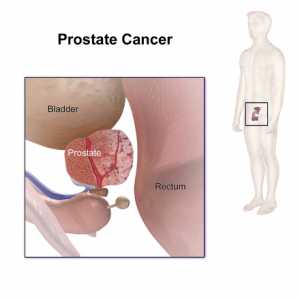While prostate cancer can be serious, most patients can be managed with the proper treatment. With the use of medications,...
Author Interviews, Nutrition, Prostate Cancer / 29.12.2024
Lifestyle Choices the Protect Against Prostate Cancer By Dr. Dan Sperling
By Dr. Dan Sperling M.D., D.A.B.R.
Medical Director and Chief of Interventional Uroradiology at the
Sperling Prostate Center in Florida
Medical Director of its parent practice, the Sperling Medical Group
If the name Dr. Dean Ornish rings a bell, it’s probably because over 30 years ago he became the poster boy for preventing heart disease through diet and exercise. His 1990 book, “Dr. Dean Ornish's Program for Reversing Heart Disease,” made the NYTimes best seller list. To this day, when we think of Dr. Ornish, we think of a long and heart-healthy life.
Although we don’t link Dr. Ornish with prostate health, there’s good reason to do so—but most men don’t know it. In 2008, the National Academy of Sciences published research by Dr. Ornish and his team in an article titled “Changes in prostate gene expression in men undergoing an intensive nutrition and lifestyle intervention.” They broke new ground in our understanding of preventing prostate cancer (PCa).
Dr. Ornish and his team showed that a comprehensive lifestyle program they designed actually caused changes in gene regulation. They designed an experimental lifestyle protocol and tested is on 30 PCa patients; all 30 had been diagnosed with low-risk PCa and were on Active Surveillance (no other treatment). At the start of the 3-month study, each patient’s biopsy samples were used to profile his PCa gene activity. Then all participants adhered faithfully to the following protocol:
- A vegan (plant-based) diet (with 10% of calories from fat
- Physical activity (walking 30 minutes a day for 6 days a week)
- Stress reduction (yoga, progressive relaxation, breathing, meditation)
- Dietary supplements (vitamins C and E, soy, fish oil, selenium)
- A weekly support group to provide advice and sustain adherence to the program.
Author Interviews, Brigham & Women's - Harvard, Genetic Research, JAMA, Karolinski Institute, Prostate Cancer / 05.07.2024
Prostate Cancer: Men With Genetic Risk at Increased Risk of Dying Early
MedicalResearch.com Interview with:
Anna Plym PhD
Department of Medical Epidemiology and Biostatistics,
Karolinska Institutet, Stockholm, Sweden
Department of Epidemiology, Harvard T. H. Chan School of Public Health
Department of Urology, Brigham and Women’s Hospital
Harvard Medical School, Boston, Massachusetts
MedicalResearch.com: What is the background for this study?
Response: Prostate cancer is one of the leading causes of cancer death among men, with approximately one third of the deaths occurring before the age of 75 years. There is a need for a better understanding of the risk factors for those early deaths. Our previous research has indicated that inherited factors play a major role.
(more…)
Author Interviews, Cancer Research, Prostate, Prostate Cancer, Urology, Vaccine Studies / 08.04.2024
AACR24: Icahn Mt. Sinai Study of Autovaccination Turns Cold Prostate Cancer Cells Hot
MedicalResearch.com Interview with:
Sujit Nair, PhD
Director of GU Immunotherapy Research
Department of Urology
Icahn School of Medicine at Mount Sinai
MedicalResearch.com: What is the background for this study? How is the vaccine obtained?
Response: https://classic.clinicaltrials.gov/ct2/show/NCT03262103
Dr. Tewari is the treating physician and clinical lead on the study. This is a phase I, open-label, clinical trial (NCT03262103) using a dose escalation strategy in 12 patients diagnosed with clinically localized prostate cancer with plans for surgery. The investigational agent used in the trial is Poly-ICLC, an immune modulator developed by ONCOVIR. Poly-ICLC is a double-stranded RNA that mimics viral activity, thereby stimulating the immune response.
(more…)
Author Interviews, Cancer Research, Prostate Cancer, Radiology / 25.03.2024
SIR24: MRI guided TULSA Study at 5 years Effective in Eliminating Prostate Cancer in Almost 80% of men with Fewer Sexual and Urinary Side Effects
MedicalResearch.com Interview with:
Steven S. Raman, M.D., FASR, FSIR
Professor of Radiology, Urology and Surgery
David Geffen School of Medicine
UCLA
MedicalResearch.com: What is the background for this study? Would you describe the TULSA technique?
Response: Prostate cancer is the most common solid organ cancer in men. Currently whole gland ablation relies on surgery or radiation both of which have high rates of impotence and incontinence but also have up to a 30% rate of post therapy recurrence.
TULSA is a new minimally invasive technique to treat PCa under MRI guidance with both near continuous whole gland MRI imaging and MRI thermometry to make sure the extent of lethal heating over 55 degrees Celsius is known. (more…)
Author Interviews, Biomarkers, Nature, Prostate Cancer, UCSF / 12.06.2023
PSA Screening For Prostate Cancer Can Be Improved: Genetics May Help
MedicalResearch.com Interview with:
Rebecca E. Graff, ScD
Assistant Professor
University of California, San Francisco
Department of Epidemiology & Biostatistics
Mission Hall: Global Health & Clinical Sciences Building
San Francisco, CA 94158
MedicalResearch.com: What is the background for this study?
Response: PSA screening for prostate cancer has long been controversial. While it does seem to reduce mortality attributable to prostate cancer, it also results in the diagnosis of many cancers that never otherwise would have presented symptomatically. In addition, PSA levels are affected by factors other than prostate tumors (e.g., age, prostatic inflammation, and genetics), such that men with high PSA values are often referred for biopsy but do not end up having cancer. We hypothesized that accounting for the genetic component of PSA could yield adjusted values that better distinguish who should get a prostate biopsy.
(more…)
Author Interviews, Prostate Cancer / 05.04.2023
Prostate Cancer: 15 Year Follow Up Compares Treatment with Surgery, Radiation and Active Surveillance
MedicalResearch.com Interview with:
Freddie C. Hamdy FRCS, FMedSci
Nuffield Professor of Surgery, University of Oxford
Jenny L. Donovan PhD, FMedSci
Professor of Social Medicine, University of Bristol
MedicalResearch.com: What is the background for this study?
Response: Prostate cancer is a common malignancy in men. Prostate cancer diagnosis is made largely through opportunistic screening with a PSA (Prostate Specific Antigen) blood test, followed by prostate biopsies. The ProtecT study, funded by the National Institute for Health and Care Research in the UK, is the largest randomised trial of treatment in screen-detected localised prostate cancer. The study began by testing 82,429 men between the ages of 50 and 69 years, across nine UK centres with a PSA blood test, followed by biopsies of the prostate if the PSA level was elevated. 2,664 men with clinically localised prostate cancer were found. From these, 1,643 (62%) agreed to be randomised to Surgery (radical prostatectomy to remove the prostate gland), Radiotherapy (external beam with a period of hormone treatment beforehand), or Active Monitoring (where men received regular checks and further investigations, with change to radical treatment as necessary). The men were carefully followed up for an average of 15 years. In parallel, the side-effects of treatments and quality of life of these men was investigated using patient-reported outcomes included in an annual study questionnaire completed for at least 12 years.
(more…)
Author Interviews, Cancer Research, Genetic Research, JAMA, Personalized Medicine, Vanderbilt / 18.03.2023
Prostate Cancer: Vanderbilt Study Evaluates Clinical Usefulness of Polygenic Risk Score
MedicalResearch.com Interview with:
Jonathan Mosley, MD, PhD
Associate Professor
Division of Clinical Pharmacology
Departments of Internal Medicine and Biomedical Informatics
Vanderbilt University Medical Center
MedicalResearch.com: What is the background for this study?
Response: Prostate cancer is an important source of morbidity and mortality among men. Earlier detection of disease is essential to reduce these adverse outcomes. Prostate cancer is heritable, and many single nucleotide polymorphisms (SNPs) associated with disease risk have been identified. Thus, there is considerable interest in using tools such as polygenic risk scores, which measure the burden of genetic risk variants an individual carries, to identify men at elevated risk of disease.
(more…)
Author Interviews, JAMA, Prostate Cancer, Race/Ethnic Diversity, UCLA / 03.01.2022
Prostate Cancer: Comparison of Outcomes for Black and White Men Treated with Radiation Therapy
MedicalResearch.com Interview with:
Ting Martin Ma, MD, PhD
Resident Physician
Amar U. Kishan, MD
Assistant Professor, Department of Radiation Oncology
Vice-Chair of Clinical and Translational Research
Department of Radiation Oncology at UCLA
MedicalResearch.com: What is the background for this study?
Response: We know from epidemiologic studies that Black men are more likely to be diagnosed with and die of prostate cancer than White men. Recent studies hinted that Black men had better oncological outcome (such as prostate cancer specific mortality and overall survival) responding to systemic therapy for advanced prostate cancer (e.g. cancer that has spread or metastasized to other parts of the body).
The question we were trying to answer in this study is: is there a difference in outcomes between Black and White men with localized prostate cancer (cancer that has not spread) receiving definitive radiotherapy enrolled in clinical trials? (more…)
Author Interviews, Exercise - Fitness, JAMA, Prostate Cancer / 24.08.2021
Prostate Cancer: Effects of HIIT Program on Localized Disease
MedicalResearch.com Interview with:
Kerry S. Courneya, PhD
Professor and Canada Research Chair in Physical Activity and Cancer
Director, Behavioral Medicine Laboratory and Fitness Center
Faculty of Kinesiology, Sport, and Recreation | College of Health Sciences
University of Alberta | Edmonton, Alberta | CANADA
MedicalResearch.com: What is the background for this study?
Response: An increasing number of men with low risk prostate cancer (PCa) do not receive any immediate medical treatments for their PCa. This practice is called active surveillance (AS). It can be very stressful for men because about one-third of them will eventually experience disease progression and require medical treatments. Right now, there is nothing these men can really do for themselves other than to attend all of their follow-up medical visits. Some research has shown that exercise may slow the progression of prostate tumours and metastasis in animal models and improve quality of life in men during and after PCa treatments. Very little research, however, has been conducted in the AS setting. We wanted to see if a high intensity interval training exercise program could improve fitness and prevent or delay biochemical progression of PCa in the AS setting.
(more…)
Author Interviews, Cancer Research, COVID -19 Coronavirus, JAMA, Prostate Cancer, Race/Ethnic Diversity / 23.07.2021
Black Men Less Likely to Have Prostate Surgery During COVID Lockdown
MedicalResearch.com Interview with:
Andres F. Correa, MD
Assistant Professor
Department of Surgical Oncology, and
Adrien Bernstein, MD
Second Year Urologic Oncology Fellow
Fox Chase Cancer Center
MedicalResearch.com: What is the background for this study?
Response: Unfortunately, it has been well-established that historically Black Americans experience increased cancer specific mortality compared to white patients. In prostate cancer specifically studies have shown that when access to care is equitable this gap resolves. This suggests that biological factors are not driving these differences but rather the result of the complex interplay of social determinants and systemic inequities in our healthcare system.
Early in the pandemic, multiple studies demonstrated that minority communities disproportionately shouldered poor COVID-19 outcomes. On March 13th 2020, the American College of Surgeons recommended against elective procedures; however, the definition of an elective oncologic case was left to the discretion of the provider. As prostate cancer treatment can be safely deferred up to a year follow diagnosis, management of prostate cancer during the initial lockdown period of the COVID-19 Pandemic provided a useful analysis of the differential restrictions placed on non-emergent health care during the Pandemic. (more…)
Author Interviews, Brigham & Women's - Harvard, Journal Clinical Oncology, Prostate Cancer, Radiation Therapy / 04.06.2021
High Risk Prostate Cancer: Adjuvant Radiation May Reduce Risk of Death
MedicalResearch.com Interview with:
Anthony D'Amico, MD, PhD
Professor and Chief of Genitourinary Radiation Oncology
Brigham and Women's Hospital and Dana-Farber Cancer Institute
MedicalResearch.com: What is the background for this study?
Response: 3 randomized trials published in Sept, 2020 in the Lancet and Lancet Oncology concluded that delivering radiation therapy (RT) after surgery for prostate cancer when the PSA rises signaling recurrence (i.e. early salvage RT) as opposed to when the PSA is undetectable (i.e. adjuvant RT) did not compromise subsequent cancer progression.
However these trials may have missed the benefit of adjuvant RT because a minority of men (9 to 17% of the study cohorts) were found to have adverse factors at prostatectomy which are associated with cancer progression and death from prostate cancer.
Specifically, men with adverse pathology at prostatectomy comprise the vast majority of men who go on to die from prostate cancer and therefore have the most to gain from adjuvant RT. Yet, given the results of the 3 randomized trials many physicians are no longer offering adjuvant RT, even in men with adverse pathology at surgery. (more…)
Author Interviews, Lipids, Prostate Cancer / 03.06.2021
Maintaining Low Cholesterol May Help Prevent Spread of Prostate Cancer
MedicalResearch.com Interview with:
Michelle Hill, PhD
Head, Precision & Systems Biomedicine Group
QIMR Berghofer Medical Research Institute
MedicalResearch.com: What is the background for this study?
Response: The role of cholesterol and cholesterol lowering drug therapy in prostate cancer has been previously investigated with mixed results. Our previous laboratory studies indicate that high cholesterol diet accelerates the spreading of advanced prostate cancer. We also observed a change of the cellular location of cholesterol, from the cell periphery (plasma membrane) to inside the cell.
This study investigates the how the change in cholesterol location promotes prostate cancer spread.
(more…)













